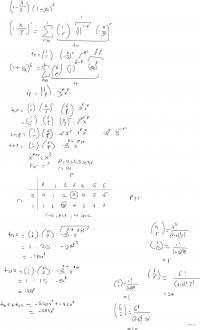Hello,
I have been asked to find the [math]x^3[/math] term of the following expansion: [math](1-\frac{x}{3})(1+3x)^6[/math]. My answer to this was [math]-585x^3[/math]. However, when I checked the answer scheme, it was [math]495x^3[/math]. The error here is unknown to me; I have attached my steps to the answer. It would be appreciated if anyone could point out the error.
I have been asked to find the [math]x^3[/math] term of the following expansion: [math](1-\frac{x}{3})(1+3x)^6[/math]. My answer to this was [math]-585x^3[/math]. However, when I checked the answer scheme, it was [math]495x^3[/math]. The error here is unknown to me; I have attached my steps to the answer. It would be appreciated if anyone could point out the error.

